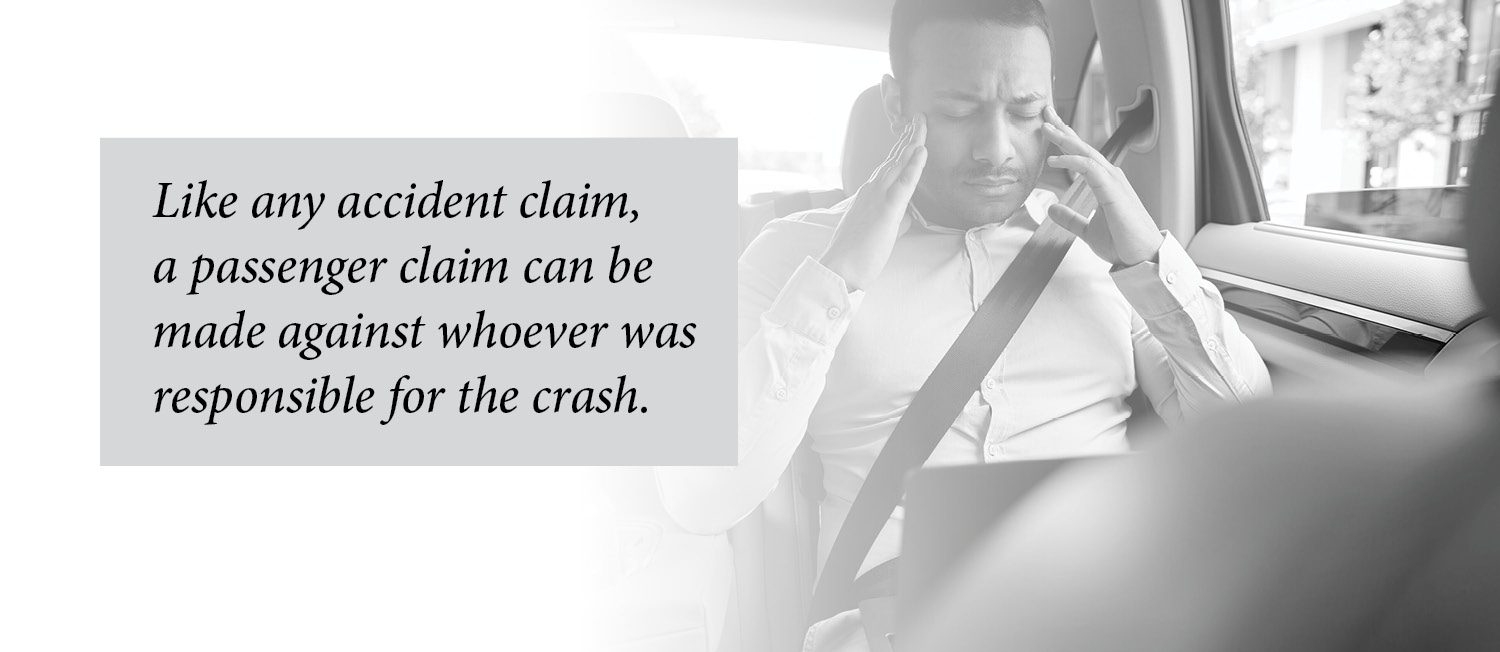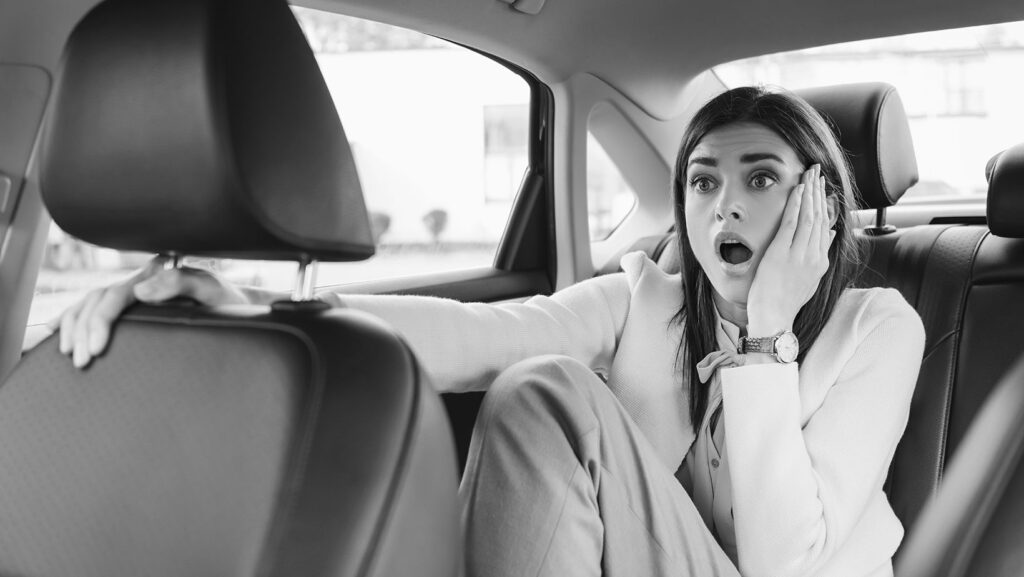We usually discuss accidents and personal injury settlements from the driver’s perspective. But what if you are a passenger injured in an auto accident? Can a passenger in a car sue the driver?
Anyone who suffers a personal injury due to someone else’s negligence is entitled to compensation. If insurance won’t cover damages, a passenger can sue. The at-fault driver—whether behind the wheel of the car the passenger is riding in or driving another vehicle—can be held liable for the costs of any victim’s injuries.
It’s important to note, however, that making an insurance claim is slightly different for a passenger. An experienced car accident attorney can help uncover unexpected sources of insurance money and recognize when it’s necessary to file a lawsuit.
A Passenger Injured in an Auto Accident Has a Right to Compensation in Most Cases
Just because you were not behind the wheel or don’t own the car you’re riding in does not mean you’re out of luck if you’re injured in an accident. A negligent driver is responsible for everyone who gets hurt, whether in their vehicle or another one. As a passenger, you have a right to compensation for your immediate medical costs, ongoing treatment, and any loss of income due to the incident.
Like any accident claim, a passenger claim can be made against whoever was responsible for the crash. What makes passenger claims unique is that the claim may be made against a friend or acquaintance who was driving (if they are at fault), rather than the stranger in another car. And if the at-fault driver’s insurance is insufficient, the passenger can file a lawsuit.
Family Members Under the Same Policy May be an Exception
The one exception is if the passenger is covered under the driver’s insurance policy. In addition to the insured, coverage typically extends to the policyholder’s spouse and unlicensed children, as well as any other licensed relatives at the same address. If the insured is at fault, these individuals would not be able to file a claim or sue for anything beyond what their particular policy might cover.
So, if a Dad driving kids to school in a car pool causes a crash, his own kids may be covered by his insurance. If the neighbor kids are hurt, their parents can file a claim with the driver’s insurance company on their child’s behalf. And if a settlement can’t be reached, they can sue.
Assigning Liability
Assigning liability is an important part of getting compensation after a car accident, and the drivers involved and their insurance companies often disagree about who is to blame. This can lead to innocent drivers having to defend themselves against accusations of negligence.
Passengers have an easier time, as it’s almost impossible for them to be at fault. They would need to create some sort of major disturbance or distraction for the driver. Instead, accidents usually involve one of the following scenarios:
- A single-car accident where the passenger’s driver was reckless, distracted, or otherwise negligent.
- The passenger’s driver was speeding, impaired, or otherwise to blame for colliding with another vehicle.
- Another driver’s carelessness caused a collision with the car in which the passenger was riding.
It is also possible for multiple parties to share responsibility for an auto accident.
- New Mexico is a comparative negligence state. This means that two or more drivers can be negligent and therefore liable. A percentage of total blame is assigned to each party. For example, if the insurance companies agree that Driver A was 30% responsible and Driver B was 70%, 30% of the compensation will come from Driver A and the rest from Driver B.
- An accident with a semi-truck or other commercial vehicle can result in shared liability between the driver, the trucking company, and even the vehicle’s manufacturer or mechanics.
- Dram shop laws can hold bars and restaurants responsible for crashes caused by intoxicated drivers whom they served.
A passenger injured in an auto accident may file a claim against, or sue, not only the driver of the car but also others depending on the circumstances. An experienced personal injury attorney can help determine who was ultimately liable and therefore where to seek compensation.

Identifying All Possible Coverage
Compensation for a passenger injured in an auto accident can come from several different sources. A lawyer will sort out questions of liability and insurance details to leave no stone unturned. Based on New Mexico’s laws and insurance rules, passengers can do the following in addition to filing a claim against or suing the at-fault driver:
Liability Coverage Beyond Policy Limits
New Mexico requires drivers to carry minimum liability insurance, but the requirement is low: only $25,000 per person and $50,000 per accident for bodily injury. Say there is a two-car crash with shared liability. If the cost of the passenger’s injuries max out one driver’s coverage, they can collect from the other at-fault driver too, regardless of the comparative negligence percentage of the drivers.
Uninsured and Underinsured Coverage
Nearly 22% of drivers in New Mexico are uninsured. Some drivers purchase uninsured or underinsured (UM/UIM) driver insurance to protect themselves in case they are hurt by one of them. A passenger who carries UM/UIM can make a claim on their own policy as well as on that of the driver.
Stacking
New Mexico allows a practice called “stacking.” If a driver or passenger owns three cars, each with UM/UIM coverage of $25,000, they can “stack” the coverage and make a claim for up to $75,000.
Health Insurance
Injured passengers can use their health insurance policy to cover the cost of their injuries. The health insurance company may, however, seek subrogation. This means they will attempt to collect money from the applicable auto insurance companies to reimburse the benefits they pay to cover the victim’s expenses.
Passengers Need Good Attorneys Too
Drivers aren’t the only ones who can be victims of a negligent driver. Passengers may be harmed in a crash because of the actions of the person they’re riding with or the recklessness of another vehicle.
These cases can become complex as the parties argue over who is at fault and the insurance companies try to settle for as little as possible. Drivers and their insurance carriers may drag things out by refusing to settle. If there are multiple people injured, a judge may need to get involved to decide how coverage is divided.
These are all good reasons to contact a law firm you can trust like Kane Personal Injury. Our skilled attorneys know how to tap into whatever sources of coverage are available to get you the compensation you deserve. Call us today.
